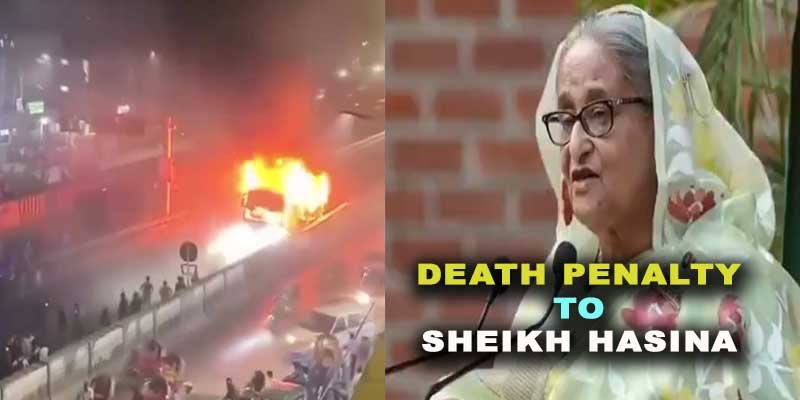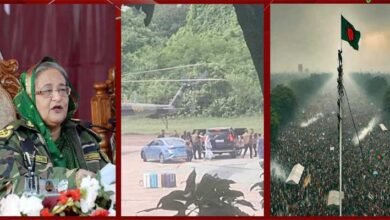Bangladesh Tribunal Issues Death Sentence to Ousted PM Sheikh
International Crimes Tribunal sentences former PM Sheikh Hasina to death in absentia for the 2024 protest crackdown, triggering violent unrest across Bangladesh.

DHAKA ( Bangladesh )- In a dramatic turn that has ignited nationwide unrest, Bangladesh’s International Crimes Tribunal (ICT) on Monday convicted former Prime Minister Sheikh Hasina of crimes against humanity, sentencing her to death in absentia for her role in the brutal suppression of student-led protests last summer.
The 77-year-old leader, who fled to India in August 2024 amid a popular uprising, was branded the “architect” of a violent crackdown that claimed over 1,400 lives and injured thousands more, according to prosecutors.
The three-judge panel delivered the verdict in a packed courtroom in Dhaka, marking a symbolic victory for the student activists who toppled Hasina’s 15-year authoritarian rule.
Also Read- Tragic Accidental Blast at Srinagar’s Nowgam Police Station Claims Nine Lives, 32 Injured
Alongside Hasina, former Home Minister Asaduzzaman Khan Kamal was also sentenced to death, while ex-police chief Chowdhury Abdullah Al-Mahmud drew a five-year prison term.
The tribunal ordered substantial compensation for victims’ families, underscoring the scale of the atrocities committed during the July 2024 protests, which began as demands for quota reforms but escalated into a broader revolt against corruption and repression.
Watch Video
The announcement triggered immediate chaos across Bangladesh. In Dhaka, jubilant crowds of anti-Hasina demonstrators clashed with supporters of her Awami League party, leading to arson attacks on vehicles and government offices. Reports indicate at least 28 deaths in the ensuing violence, with crude bombs and gunfire exchanged in the streets.
Also Read- NDA Tsunami in Bihar: BJP & JDU Crush Opposition, Nitish Eyes 5th Term CM!
Nobel laureate Muhammad Yunus, who leads the interim government, saw his office vandalized amid the frenzy. Authorities responded swiftly, imposing shoot-on-sight curfews in volatile areas and deploying the Border Guard Bangladesh (BGB) to quell the riots. Internet services were throttled in parts of the city, and schools and businesses shuttered as tensions simmered ahead of February 2026 elections—from which the Awami League has been banned.
“This is justice delayed but not denied,” said a student protester outside the tribunal, echoing sentiments from human rights advocates who praised the ruling as a milestone for accountability.
The conviction has thrust India into the spotlight, with Dhaka formally demanding the extradition of Hasina, who has been sheltered in New Delhi since her exile.
Bangladesh’s Foreign Ministry issued a stern note, urging “immediate cooperation” to bring her back for trial. India’s Ministry of External Affairs (MEA) responded cautiously, stating it has “noted” the developments and is “closely monitoring” the situation but offered no timeline on extradition.
Critics, including Awami League loyalists abroad, decried the verdict as a “witch hunt” orchestrated by the interim regime to consolidate power. Hasina’s son, Sajeeb Wazed, dismissed it from exile in the U.S. as “politically motivated revenge.” The case, one of several against the former “Iron Lady,” could set precedents for prosecuting other ex-officials and reshape Bangladesh’s fragile transition to democracy.
This ruling arrives as Bangladesh grapples with economic fallout from the uprising—GDP growth slowed to 4.5% this year—and rising sectarian tensions. International observers, including the UN, have called for calm and fair elections, warning that further instability could exacerbate refugee flows into neighboring India and Myanmar.
As night falls over Dhaka, the city remains on edge. Security forces patrol key intersections, and opposition leaders urge restraint. The death sentence, while unlikely to be carried out soon given Hasina’s absence, symbolizes the end of an era—and the uncertain dawn of another.









